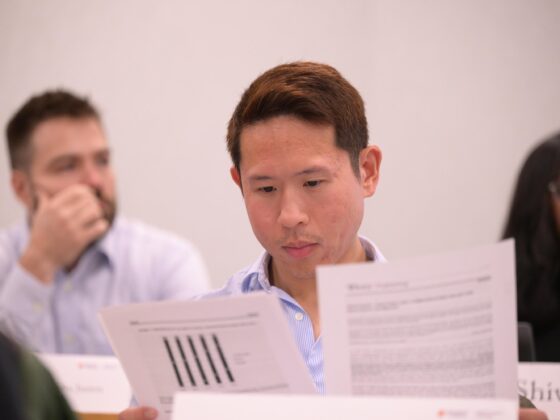Today we are continuing our celebration of Women’s History Month (yes, it’s somehow still March!) with insights on combatting imposter syndrome from Jaila Ingram-Johnson (EMBA ’20). Ingram-Johnson was named one of Poets & Quants ‘2020 Best & Brightest Executive MBAs’ after an unprecedented professional path, working her way into senior roles after starting out as an administrative assistant. She also managed to balance work, life, school with incredible dexterity — serving as a class representative and actively participating in Darden’s Black Executive MBA student organization.
Imposter syndrome impacts individuals of all abilities and experiences. As this Ted-Ed video notes, Maya Angelou and Albert Einstein both expressed feelings of fraudulence. For more on this topic, view our earlier post featuring Maeve McGilloway (MBA ’17) and her journey to ‘quiet the imposter voice’.
Jaila Ingram-Johnson (EMBA ’20) Associate, Chase Associate Program at JPMorgan Chase & Co.

Imposter syndrome never truly goes away, but that is part of the beauty in the journey. Every time I’ve been able to overcome my battle with imposter syndrome, I’ve relearned just how capable and how fierce I can be. In each step of the journey, we’re learning, growing and evolving into a newer, more powerful being. And like any journey, each stage has its own mountains and valleys to traverse. This is how I’ve learned to treat imposter syndrome, a mountain or valley to overcome to reach my next step of my beautiful journey. I may feel down, insecure, or anxious about my ability to execute my role professionally, but I will always work towards allowing my light to shine brightly. In high school, I didn’t believe I deserved to be in the honors classes. In college, I didn’t think I deserved to be in one of the top liberal art business schools. At Darden, I didn’t think I could have a voice among my well-accomplished classmates, and most recently, I didn’t think I deserved to work for a top global financial institute, and yet, here I am, deserving of every moment and every experience.
Now that I have had much practice working through my experience with imposter syndrome, I have started a little toolkit for myself to recover and bounce back faster than previous battles. The first tool in my kit is to always make space for myself to feel my emotions fully. After being anxious, snappy or overwhelmed for a few days in a row, I find some quiet moments to internally talk through what I am feeling and reasons I may be feeling it. Many times, at this point, I’m able to identify what I am feeling and how to adjust my behavior and remind myself that I am exactly where I am supposed to be and I deserve all the good things that are happening to me. Sometimes this first tool isn’t enough, and I need to tap into my next tool of trusted friends, family or even my counselor. I call this group my personal board of directors, it is comprised of my mother, wife, a couple close college friends, a couple of childhood friends, and of course my counselor. My board always has my best interest at heart, they are compassionate, loving, and will tell me the truth regardless of how it makes me feel, which is key. They are typically able to talk me through my feelings and remind me that I’m deserving. But, the most important tool to battle imposter syndrome is remembering to give yourself grace. You are doing your very best with what you have to offer in every given moment. Your mental/emotional or physical resources are not the same day to day, and that’s perfectly fine, just keep pushing.
Be sure to consult the Latest News regularly for the most updated news releases and media hits. Check out faculty thought leadership published on Ideas to Action. And stay connected with us via social media: Facebook, Instagram, LinkedIn, Twitter, WeChat
Pictured in header image: View of the Kennedy Center, Washington Monument and U.S. Capitol Building from UVA Darden DC Metro Sands Family Grounds.





